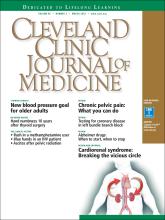Article Figures & Data
Tables
Drug Proprietary name (date approved) Indications Formulations Cholinesterase inhibitors Donepezil Aricept (1996), generics available Mild to moderate disease (5–10 mg), moderate to severe disease (10–23 mg) Tablets, disintegrating tablets Rivastigmine Exelon (2000), generics available Mild to moderate disease Tablets, oral solution, transdermal patch Galantamine Razadyne (2001), generics available Mild to moderate disease Immediate-release tablets, oral solution, extended-release tablets N-methyl-d-aspartate receptor antagonist Memantine Namenda (2003), generics available Moderate to severe disease Tablets, oral solution Combination drug Donepezil + memantine Namzaric (2014), generics available Moderate to severe disease Extended-release capsules Dementia category Global Deterioration Scale (stages 1–7) Medications Not demented 1 No cognitive impairment
2 Very mild decline: age-associated cognitive impairment
3 Mild cognitive impairment, minor neurocognitive declineNo indication for cognitive enhancers Mild dementia 4 Decreased knowledge of current and recent events
Decreased ability to travel, handle finances, and manage basic activities of daily livingCholinesterase inhibitors Moderate dementia 5 Unable to recall a major relevant aspect of their current life, an address or telephone number of many years, or the names of close family members
Basic activities of daily living begin to be impairedCholinesterase inhibitors with or without an NMDA receptor antagonist Severe dementia 6 Occasionally forgets the name of the spouse or caregiver on whom he or she is entirely dependent
Unaware of all recent events and experiences in their lives
Most basic activities of daily living impairedCholinesterase inhibitor (donepezil) with or without an NMDA receptor antagonist Advanced dementia 7 Cannot speak or walk, has incontinence and difficulty swallowing No randomized controlled trials in stage 7 NMDA = N-methyl-d-aspartate
Based on information in references 11 and 12.
Cholinesterase inhibitors NMDA receptor antagonist Donepezil Galantamine Rivastigmine Rivastigmine transdermal Memantine Nausea 3%–19%a 21% 17%–47% 2%–4% Not available Diarrhea 5%–15%a 7% 5%–19% ≤ 7% 5% Constipation 3%–5% Anorexia 2%–8% 7% (decreased appetite) ≥ 17%
3%–26% (weight loss)≤ 3% < 1%
3% (weight gain) (extended-release formulation)Vomiting 3%–9%a 11% 13%–31% 3%–9% 2%–3% Insomnia 2%–14% Not available 1%–9% Not available Not available Headache 3%–10% 7% 4%–17% ≤ 4% 6% Dizziness 2%–8% 8% 6%–21% ≤ 6% 5%–7% Fatigue 1%–8% 4% 4%–9% 2%–4% 2% Syncope 2% 1% 3% (falling)
6%–12%Not available Not available Bradycardia ≥ 1% 1% < 1% < 1% < 1% Infection 11% < 1% 1%–10% (urinary tract infections) Not available 4% (influenza) ↵a Dose-related.
NMDA = N-methyl-d-aspartate






